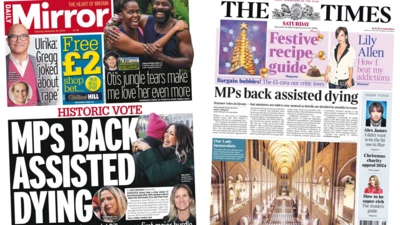We've updated our Privacy and Cookies Policy
We've made some important changes to our Privacy and Cookies Policy and we want you to know what this means for you and your data.
Renewed surge in PPI complaints to financial ombudsman
A fresh jump in payment protection insurance (PPI) complaints has driven up the total number of cases going to the Financial Ombudsman Service (FOS).
The FOS received 55,907 complaints in the last three months of 2011, up by 10% from the previous three months.
That was due to a 57% jump in PPI complaints during the same time, from 19,259 to 30,301.
The FOS makes rulings on complaints that financial firms have failed to resolve themselves.
At 54% of the current FOS workload, fresh complaints about PPI policies still far outstrip the other types of problem being dealt with by the ombudsman.
Credit cards, current accounts and mortgages between them accounted for just 18% of all complaints received between October and December last year.
PPI insurance was supposed to cover loan repayments if a borrower became ill or lost their job.
But after years of campaigns by consumer groups, and investigations by regulators, it became clear that many of the polices had been mis-sold, for instance to people who did not need them or to people who would never have been able to make a valid claim.
Problems persist
The renewed volume of PPI complaints indicates that the banking industry - the main seller of this type of insurance - still has a long way to go before the PPI scandal is finally cleared up.
In the final three months of last year, the FOS found in favour of the customers in 68% of the PPI cases it considered.
Although that was lower than the 92% success rate for aggrieved customers in the third quarter of 2011, it was still higher than the 66% success rate recorded in the whole of the 2010-11 financial year.
After years of denying that there was anything wrong with the policies, or the way they had been sold, the banking industry was finally forced to cave in last year.
In early 2011, the British Bankers' Association (BBA) lost a High Court challenge to the demand of the Financial Services Authority (FSA) that past sales of PPI should be reviewed and that new, stricter, rules be applied to sales of the insurance in the future.
This meant, among other things, that 200,000 complaints that had been put on hold during the legal case now had to be dealt with, with a deadline of the end of August for paying out or rejecting the backlog of complaints.
With some of these claims for compensation being rejected, and fresh ones still coming in, the flow of disputes going to the Ombudsman shows no sign of letting up.
A drop in the number of these unresolved disputes in the third quarter of last year may now turn out to have been a blip.
Between them the big banks have set aside just over ВЈ6bn to cover the cost of compensation payments to hundreds of thousands of customers.
Last year, Barclays said it would pay out on a "no-quibble" basis to all customers disgruntled by the purchase of their PPI policies, if they had lodged a mis-selling claim before 20 April 2011.
Top Stories
More to explore
Most read
Content is not available








